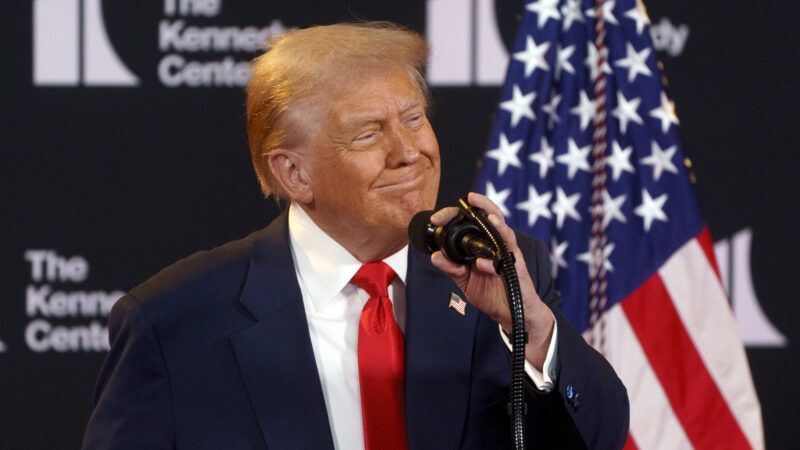Trump Says 'People Are Feeling Safer Already,' but Federal Troops Won't Fix D.C.'s Crime
Local government incompetence has crippled the city's criminal justice system.

After just two days, President Donald Trump is already trumpeting his decision to federalize the Washington, D.C., police force and send in the National Guard as a rousing success.
"As of about yesterday…you see a big change and people are feeling safer already," said Trump at the Kennedy Center on Wednesday, during remarks that were recorded by Reason's Justin Zuckerman. "They were afraid to walk out. They're not afraid anymore."
City residents who are eager for sound solutions to D.C.'s enduring crime problems should hold their applause: A temporary display of police force is not a panacea for the widespread government incompetence that continues to cripple D.C.'s criminal justice system.
Dozens of National Guard troops appeared on the National Mall on Tuesday, and up to 800 of them are expected to come to D.C. by next week. The increased police presence in the nation's capital this week has yielded more than 100 arrests. The most significant category of arrests on Tuesday was for firearms violations, with 33 arrested on such charges and 24 guns confiscated by police. Authorities also arrested 23 illegal immigrants, seven alleged drug offenders, and one homicide suspect.
Federal law enforcement agents were also spotted in the upscale Georgetown neighborhood, as well as Navy Yard—an area of the city that has seen a significant number of carjackings in recent years, including that of a sitting member of Congress.
The crime situation in D.C. is extremely complex: The statistics are not entirely reliable, and jurisdictional standoffs between the city and the feds were common even before Trump's latest move. Moreover, several factors, including the appallingly high number of murders in 2023 and the enduring trend of marauding teenagers committing opportunistic acts of violence and theft, have certainly created the impression that the city is as dangerous as ever—even though official reports suggest that the post-pandemic crime surge has abated. Trump's appraisal of the crime situation may be somewhat divorced from reality, but it's nevertheless true that the nation's capital should be setting a much better example. D.C. residents certainly deserve more from their government.
In theory, hiring more police officers could be a piece of the puzzle; both the mayor and the chief of police maintain that police staffing levels are historically low. A temporary infusion of National Guard troops stationed around the monuments—which are relatively safe areas—will not make much difference, however.
The incident that kicked off Trump's federal takeover of the D.C. police was the assault of 19-year-old former Department of Government Efficiency staffer, Edward Coristine, by a group of juvenile vandals near Dupont Circle and Logan Circle, trendy areas of the city with high levels of foot traffic. An increased police presence in neighborhoods that have recently become prone to antisocial behavior from large numbers of young people would probably deter opportunistic criminal attacks.
Of course, tackling the most serious kinds of crime in D.C.—gun homicides—would involve sending more police, or at least the most experienced police, into the most crime-ridden areas of the city: Wards 7 and 8, which are on the other side of the Anacostia River. Unfortunately, as Joseph Bishop-Henchmen documented in his must-read article for the July 2024 issue of Reason, police officers with the most seniority and expertise get their choice of jobs, and usually leave the really tough policing to the rookies.
Indeed, this speaks to the city's overall problem, which is well explained by Bishop-Henchmen: Local government incompetence caused a total breakdown of D.C.'s criminal justice system. A main culprit is the D.C. forensics laboratory, which was de-accredited in 2021 due to numerous problems. This meant that for years, prosecutors had no working lab to help process evidence to assist with cases; as a consequence of this and other issues, successful prosecutions plummeted. Earlier this year, the crime lab regained accreditation, though it is reportedly still unable to do ballistics testing.
For D.C.'s crime situation to improve dramatically, high crime areas need somewhat more attention from the authorities, homicide detectives need to put more effort into solving cases, and prosecutors need both the tools and the willpower to do their jobs effectively. If federal troops intend to assist with any of that, great. If not, then Trump's takeover is at best a stunt.


Show Comments (85)